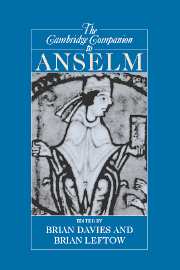Book contents
- Frontmatter
- Introduction
- 1 Anselm’s life, works, and immediate influence
- 2 Anselm on faith and reason
- 3 Anselm, Augustine, and Platonism
- 4 Anselm’s philosophy of language
- 5 Anselm on modality
- 6 Anselm’s perfect-being theology
- 7 Anselm and the ontological argument
- 8 Anselm’s account of freedom
- 9 Anselm on truth
- 10 Anselm on ethics
- 11 Anselm on the Trinity
- 12 Anselm on atonement
- Bibliography
- Index
8 - Anselm’s account of freedom
Published online by Cambridge University Press: 28 May 2006
- Frontmatter
- Introduction
- 1 Anselm’s life, works, and immediate influence
- 2 Anselm on faith and reason
- 3 Anselm, Augustine, and Platonism
- 4 Anselm’s philosophy of language
- 5 Anselm on modality
- 6 Anselm’s perfect-being theology
- 7 Anselm and the ontological argument
- 8 Anselm’s account of freedom
- 9 Anselm on truth
- 10 Anselm on ethics
- 11 Anselm on the Trinity
- 12 Anselm on atonement
- Bibliography
- Index
Summary
INTRODUCTION
According to Anselm's official definition, freedom of choice is “the power to preserve rectitude of will for the sake of that rectitude itself.” From the point of view of contemporary metaphysics, this is one of the most unhelpful definitions imaginable. Does such freedom require alternative possibilities, for example? Is it compatible with causal determination? Is the exercise of such freedom a necessary and sufficient condition for moral responsibility? The definition sheds no light on these questions.
So we need to move on from Anselm’s definition to Anselm’s account of freedom. Here, though, we encounter the opposite problem. Where Anselm’s definition seems not to answer these questions at all, Anselm’s account seems to answer all these questions, sometimes with a yes and sometimes with a no. Consider the question about alternative possibilities. In De Libertate Arbitrii, Anselm seems clearly to deny that freedom involves alternative possibilities. God, the good angels, and the blessed dead cannot do otherwise than preserve rectitude, but they are still free – freer, in fact, than those who are capable of abandoning rectitude. On the other hand, in De Casu Diaboli Anselm seems to require alternative possibilities for freedom. For if an angel is to be just, Anselm says, he must have both the power to will rectitude and the power to will happiness. If only one power were given him, he would be able to will nothing but rectitude or nothing but happiness, as the case might be; being unable to will otherwise, his will would be neither just nor unjust. Now justice, according to De Veritate 12, is rectitude of will preserved for its own sake. So an angel without alternative possibilities cannot have rectitude of will, and a fortiori cannot preserve rectitude of will; hence, an angel without alternative possibilities is not free.
- Type
- Chapter
- Information
- The Cambridge Companion to Anselm , pp. 179 - 203Publisher: Cambridge University PressPrint publication year: 2004
- 6
- Cited by



